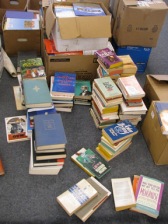
Sonja Hakala’s Your Book, Your Way is being revised and renamed. You can read sections of What Would William Shakespeare Do? in real time right here. If you want to start at the beginning, you can by clicking here.
How would you answer to the following questions:
- If you write the first draft of your fiction by hand in composition books, do they constitute a book?
- If you slide a CD into the player in your car to listen to a P.G. Wodehouse story, is that CD a book?
- If you write the first draft of your work on a laptop computer, does the word processing file you produce constitute a book?
- What if you use one of the cloud-based softwares to pen your great American novel? Is that a book?
- What about the biography you read on your Kindle or iPad? Is the ebook on your reading device a book?
- What about a PDF that you send to to printer to make chapbooks of your poetry? Is that a book?
- If you draw pictures to illustrate a story that’s written on the same pieces of paper, and then bring that pile of pages to a copy shop, which one of those items would you call a book—the pile of original pages or the copies?
Believe it or not, the way you define the word “book” may not be the same as the way a self-publishing or traditional publishing company or distribution company defines “book,” and knowing the difference is critical for contemporary authors.
For the purposes of your understanding while you’re in the pages of What Would William Shakespeare Do?, here is the definition of book that we are going to use: A book is the original source from which an author’s work is made manifest to its end consumer.
Sounds like it was written by a lawyer, doesn’t it?
To make this clear, let’s take the list of questions at the beginning of this chapter and go through them one at a time to figure out what’s a book and what isn’t.
- If you write the first draft of your fiction by hand in composition books, do they constitute a book?
Yes, though you probably wouldn’t want anyone to read it. First drafts are meant to be ugly beasts. But you could make copies of it for others. The composition books are an original source from which an author can make duplicates to share with consumers, readers in this case.
- If you slide a CD into the player in your car to listen to a P.G. Wodehouse story, is that CD a book?
No. In this case, the CD is a copy of an original audio file made by a voice artist. The audio file is the original source, the “book.” The CDs are the way that that original source material can be shared with consumers or listeners in this case.
- If you write the first draft of your work on a laptop computer, does the word processing file you produce constitute a book?
Yes. Your word processing file is an original source. Like the composition books or audio files discussed above, your word processing document can be used to make a work available to readers.
- What if you use one of the cloud-based softwares to pen your great American novel? Is that a book?
This one is tricky because the answer is “Yes…but.” Yes, your first draft on cloud-based software can be distributed to readers so in that context, it’s a “book.”
But there’s another question to ask in this case—who or what controls that file? Can you do anything you want with it? Print it out on your home printer? Convert it into an ebook file that you can use however you want?
If the answer is no, then this does not fit our definition of “book.”
- What about the biography you’re reading on your Kindle or iPad? Is the ebook on your reading device a book?
No. An ebook file on your reading device is in the same category as the CD of an audiobook. The original ebook file—either an ePub or a Mobipocket (which we’ll get to in the ebook section)—is the original source material. In other words, the original ebook file is the “book.”
- What about a PDF that you send to to printer to make chapbooks of your poetry? Is that a book?
Yes. In contemporary printing, PDFs are the original source material from which all copies of books-on-paper are made no matter what printing method—offset or digital—you use.
- If you draw pictures to illustrate a story that’s written on the same pieces of paper, and then you bring that pile of pages to a copy shop, which one of those items would you call a book—the pile of original pages or the copies?
The original pages.
Why does this matter so much?
Well, there aren’t too many hard and fast rules in contemporary publishing but here is one—Whoever or whatever controls the original source material for an author’s work controls the means by which that work gets to readers.
That is why it’s important for authors to understand what the word “book” means. Before you sign any contracts or hire a company to produce your work for readers or listeners, you need to be sure that their definition of book matches yours.
Control of original source material is NOT the same thing as controlling copyright. Both are important to understand but they are not equivalent, and informed authors need to understand the difference.
As we go on, we’ll talk about how some book companies—particularly those that call themselves self-publishers—exploit this disparity for their gain and authors’ loss.
